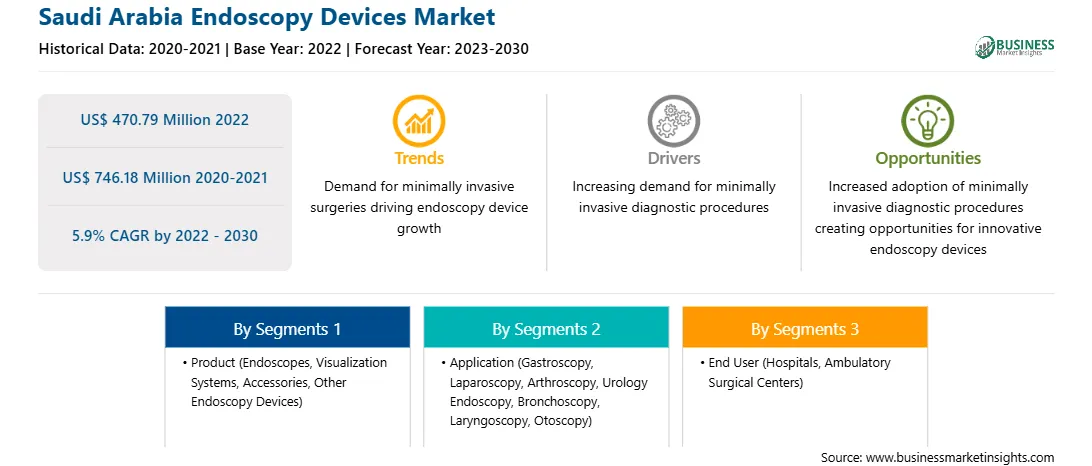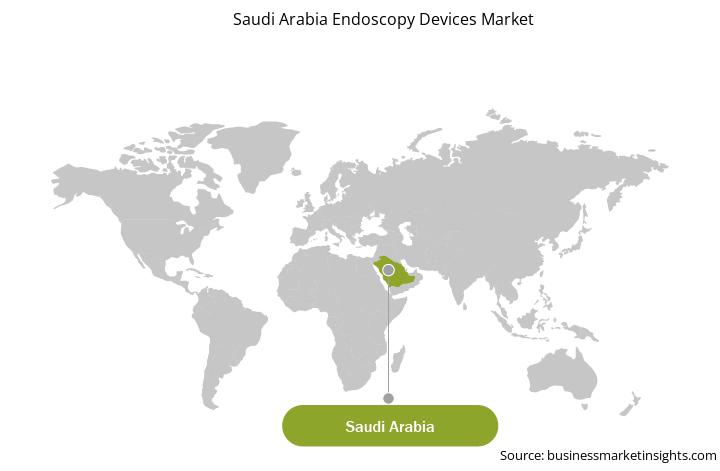The Saudi Arabia endoscopy devices market is expected to reach US$ 746.18 million in 2030 from US$ 470.79 million in 2022. The market is estimated to grow with a CAGR of 5.9% from 2022 to 2030.
Key factors driving the Saudi Arabia endoscopy devices market growth include the surging preference for minimally invasive surgeries and the increasing prevalence of cancer. However, the risks of infections associated with endoscopic procedures hinder market growth.
Market Driver of Endoscopy Devices Market
The increase in the prevalence of cancer plays a significant role in driving the demand for endoscopy devices. These devices are vital tools for diagnosis (such as biopsy), treatment, and monitoring during cancer treatments. Endoscopy procedures enable the early detection and diagnosis of various types of cancers, including esophageal, pancreatic, colorectal, and stomach cancer. Through endoscopes and imaging technologies, healthcare providers can visualize the internal structures of organs to identify abnormalities, lesions, and early-stage tumors, thereby facilitating timely intervention and improved treatment outcomes.
According to Globocan 2020, the number of cancer cases reported worldwide was 19.29 million in 2020 and is expected to reach 30.23 million cases by 2040. The age-standardized prevalence rate of all cancer cases globally was 190 cases per 100,000, and the age-standardized prevalence rate of all cancer cases in Saudi Arabia was 95.2 cases per 100,000. As per the International Agency for Research on Cancer (IARC) of the World Health Organization (WHO), Saudi Arabia records a high prevalence of colorectum cancer, breast cancer, thyroid cancer, non-Hodgkin lymphoma, leukemia, lung cancer, and liver cancer, among others. As per estimates by IARC, the number of all cancer cases in Saudi Arabia is expected to grow from 27,885 in 2020 to 60,429 by 2040. As the burden of cancer continues to rise in Saudi Arabia and the world, the adoption of endoscopy in cancer diagnostics and care becomes increasingly vital. Thus, the ongoing developments in endoscopic techniques aim to address the complexities that influence cancer intervention. Thus, the rising prevalence of cancer fuels the adoption of endoscopy devices globally and in Saudi Arabia.
Factors Hampering Endoscopy Devices Market
The risks of infections associated with endoscopic procedures hamper the market growth. Endoscopes are generally compact and closed units operated by a broad spectrum of staff members, including endoscopists, nursing staff, technicians, anesthetists, and hospital attendants; patients awaiting various treatments; and many small and large equipment providers. Patients with a high viral load in their respiratory secretions can contaminate the endoscopic air and fomites with viruses that can survive longer, placing uninfected patients and endoscopy staff at risk. Viral infections can be transmitted from person to person through direct contact or respiratory droplets, the generation of infected aerosols during endoscopy, or contact with contaminated endoscopic devices, accessories, and body fluids. Endoscopic procedures such as gastroscopy, colonoscopy, and endoscopic retrograde cholangiopancreatography are performed daily. Endoscopists work on the gastrointestinal lumen from a close distance; hence, they are exposed to several infections associated with respiratory tracts, oropharynx, and gastrointestinal systems. Along with professionals appointed in endoscopic units, medical staff from other departments are susceptible to contracting a viral infection.
Contaminated endoscopes have been associated with many outbreaks of device-related nosocomial infections in the past. Although flexible endoscopes can be disinfected, they cannot be sterilized after use. This implies the risk of settlement of biofilm-producing species. Hence, patients and physicians are raising concerns over the risks associated with the equipment used during these procedures. Thus, the application of endoscopic devices in various procedures is limited by the risk of infections associated with endoscopic devices.
Endoscopy Devices Market: Segmental Overview
The Saudi Arabia endoscopy devices market, by product, is segmented into endoscopes, visualization systems, accessories, and other endoscopy devices. The endoscopes segment held the largest market share in 2022, and the visualization systems segment is anticipated to register the highest CAGR in the market during 2022-2030. An endoscope is used in minimally invasive surgeries and can be inserted into the body's openings. The device is commonly used to examine internal organs and accordingly diagnose medical conditions visually. However, some of these devices are also used for small surgical tasks due to their flexible design, which helps reduce cost, time, and physical trauma associated with standard surgical procedures. Most of the endoscopes are similar in construction. The endoscopes are named as per the location of their use. For example, a nephroscope is used for the endoscopy of the kidney; an arthroscopy is used for joints, and a laparoscope for the endoscopy of the abdomen or pelvis. Various endoscopes are based on their structure, such as rigid, flexible, capsule, and robot-assisted endoscopes.
Based on application, the Saudi Arabia endoscopy devices market is segmented into gastroscopy, laparoscopy, arthroscopy, urology endoscopy, bronchoscopy, laryngoscopy, and otoscopy. The gastroscopy segment held the largest share of the market in 2022. However, the laparoscopy segment is expected to register the highest CAGR in the market from 2022 to 2030. Gastroscopy, also known as upper endoscopy, involves examining the upper gastrointestinal tract-the stomach, esophagus, and duodenum (the beginning part of the small intestine). It diagnoses conditions such as ulcers, tumors, inflammation, and gastroesophageal reflux disease (GERD). Laparoscopy, commonly called minimally invasive surgery, involves using a laparoscope to visualize the abdominal or pelvic cavities for diagnostic or surgical purposes. This approach offers reduced incision size, faster recovery, and lower complication risks than traditional open surgeries.
Based on end user, the Saudi Arabia endoscopy devices market is segmented into hospitals, ambulatory surgical centers, and others. The hospitals segment held the largest share of the market in 2022, and the same segment is expected to register the highest CAGR from 2022 to 2030. Hospitals encompass various medical facilities, ranging from community hospitals to large academic medical centers. They serve as major end users of endoscopy devices. Comprehensive care delivery, inpatient and outpatient services, and advanced procedures and interventions drive the demand for endoscopy devices within hospital settings.
Endoscopy Devices Market: Geographical Overview
The endoscopy devices market in Saudi Arabia is undergoing significant transformation owing to factors such as developments in healthcare infrastructure, rapidly growing medical tourism, and acceptance and adoption of advanced medical technologies. With rising investments, the private sector has played an essential role in the Saudi healthcare system. Efforts from this sector help in the timely delivery of healthcare services to numerous patients. The Saudi Vision 2030 program of the government of Saudi Arabia aims to reduce its dependence on the oil & gas sector and diversify its economy by promoting the growth of other sectors, including healthcare. Moreover, with a projected investment of US$ 13.8 billion by 2030 to improve medical facilities, the adoption of advanced surgical equipment and medical devices is likely to increase in the country.
The Saudi Food and Drug Authority (SFDA) plays a pivotal role in regulating medical devices, including endoscopy devices, ensuring adherence to international standards and certifications, thus fostering confidence in the safety and efficacy of endoscopic technologies. Similarly, Saudi Arabia's commitment to enhancing healthcare infrastructure, including the construction of state-of-the-art hospitals, specialty clinics, and medical centers, triggers the demand for advanced endoscopy devices that support a wide range of diagnostic and interventional services.
A few of the major primary and secondary sources referred to while preparing the report on the endoscopy devices market are the World Bank Data, National Health Service (NHS), SFDA (Saudi Arabia Food and Drug Administration), and WHO (World Health Organization).
Strategic insights for the Saudi Arabia Endoscopy Devices provides data-driven analysis of the industry landscape, including current trends, key players, and regional nuances. These insights offer actionable recommendations, enabling readers to differentiate themselves from competitors by identifying untapped segments or developing unique value propositions. Leveraging data analytics, these insights help industry players anticipate the market shifts, whether investors, manufacturers, or other stakeholders. A future-oriented perspective is essential, helping stakeholders anticipate market shifts and position themselves for long-term success in this dynamic region. Ultimately, effective strategic insights empower readers to make informed decisions that drive profitability and achieve their business objectives within the market.

| Report Attribute | Details |
|---|---|
| Market size in 2022 | US$ 470.79 Million |
| Market Size by 2030 | US$ 746.18 Million |
| Global CAGR (2022 - 2030) | 5.9% |
| Historical Data | 2020-2021 |
| Forecast period | 2023-2030 |
| Segments Covered |
By Product
|
| Regions and Countries Covered | Saudi Arabia
|
| Market leaders and key company profiles |
The geographic scope of the Saudi Arabia Endoscopy Devices refers to the specific areas in which a business operates and competes. Understanding local distinctions, such as diverse consumer preferences (e.g., demand for specific plug types or battery backup durations), varying economic conditions, and regulatory environments, is crucial for tailoring strategies to specific markets. Businesses can expand their reach by identifying underserved areas or adapting their offerings to meet local demands. A clear market focus allows for more effective resource allocation, targeted marketing campaigns, and better positioning against local competitors, ultimately driving growth in those targeted areas.

The List of Companies - Saudi Arabia Endoscopy Devices Market
- Boston Scientific Corp
- Medtronic Plc??? ??
- Stryker Corp???? ??
- Johnson & Johnson
- Karl Storz SE & Co KG
- Olympus Corp?? ??
- Ambu AS????????? ??
- Conmed Corp?? ??
- B Braun SE?????? ??
- PENTAX Medical
The Saudi Arabia Endoscopy Devices Market is valued at US$ 470.79 Million in 2022, it is projected to reach US$ 746.18 Million by 2030.
As per our report Saudi Arabia Endoscopy Devices Market, the market size is valued at US$ 470.79 Million in 2022, projecting it to reach US$ 746.18 Million by 2030. This translates to a CAGR of approximately 5.9% during the forecast period.
The Saudi Arabia Endoscopy Devices Market report typically cover these key segments-
The historic period, base year, and forecast period can vary slightly depending on the specific market research report. However, for the Saudi Arabia Endoscopy Devices Market report:
The Saudi Arabia Endoscopy Devices Market is populated by several key players, each contributing to its growth and innovation. Some of the major players include:
The Saudi Arabia Endoscopy Devices Market report is valuable for diverse stakeholders, including:
Essentially, anyone involved in or considering involvement in the Saudi Arabia Endoscopy Devices Market value chain can benefit from the information contained in a comprehensive market report.